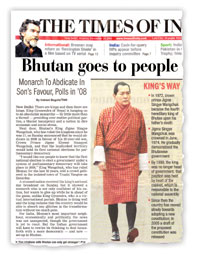 A week before King Gyanendra took over on 1 February last year, he got Sher Bahadur Deuba to close down the Dalai Lama's office in Kathmandu.
A week before King Gyanendra took over on 1 February last year, he got Sher Bahadur Deuba to close down the Dalai Lama's office in Kathmandu.
Ever since, the royal regime has been bending over backwards to lean on China. The king himself traveled to the Boao Summit in April, Foreign Minister Ramesh Nath Pandey has been commuting to Beijing, COAS Pyar Jung Thapa was there in November. And there has been a procession of Chinese delegations in Kathmandu, including a high-level Tibetan visit and one by senior PLA officials this month.
By trying to ingratiate itself to Beijing. King Gyaenendra is using his father's policy of playing India off against China. Critics point out that policy was made at a time after Nepal's two giant neighbours had just fought a bruising war in 1962. Today, they add, China and India are bhai-bhai again this strategy is hopelessly outdated.
Is it? Going by the shrill sinophobia in sections of the New Delhi chatterati, military, business and political establishment it looks like the king's effort to use residual Indian paranoia about China as leverage to build support for himelf is working. The benefit may be short-term, but that is all the king needs to ride it out. This 'inside track' into Indian policy-making circles is probably why the monarch exudes so much confidence despite his international isolation and unpopularity at home.
Last week, the New Delhi papers prominently extolled the virtues of Bhutan's King Jigme's announcement that he was stepping down in 2008. Every Indian paper made unfavourable comparisons with King Gyanendra. 'There are kings and there are kings,' said the Times of India. The general refrain: here is Bhutan's king taking his country towards democracy while Nepal's king is taking his country away from it.
This week, the papers are full of $25 million unpaid RNA arrears to various Indian companies for military hardware. The underlying message is: we could overlook it but not if you keep taunting us.
But the divergence of Indian policy towards Nepal is often played out in the media with the pro-democracy line espoused by the Ministry of External Affairs and leftist politicians and the counter opinion pieces that portray the king and the army as bulwarks against a Maoist takeover of Nepal.
India's lingering memory of being 'stabbed in the back' in 1962 is so strong there is growing alarm that South Block's diplomacy towards Nepal is 'pushing Kathmandu into the Chinese fold'. There is worry this would 'diminish India's standing in the region'.
One retired Indian official summed it up: "To counter American policy of containing China, Beijing is containing India." He is convinced China engineered the Nepali veto at SAARC in Dhaka.
Till recently, conventional wisdom was that rapprochement between China and India and closer economic ties meant the two weren't competing with each other in Nepal or elsewhere. While many still adhere to this view, some aren't so sure any more. In fact, those who talk about a benign China are now often labeled in the Indian press as 'Beijing apologists' and part of a 'pro-China lobby'.
King Gyanendra's strategy of obtaining military aid and buying arms and ammunition from China and Pakistan has worked brilliantly to stoke fears in New Delhi about Nepal going over to the other side. Sections of the Indian military establishment who have all along been against the arms embargo take this as proof the MEA's policy is pushing Nepal to China. Even though the recent $1 million military grant and the 18 trucks of grenades and bullets last month may not have been substantial, its prominent coverage in the Indian media stoked suspicions again.
Nepal's strategy of needling India by brandishing the China stick, however, is fraught with dangers and is already triggering a backlash here. Even some hawks now think King Gyanendra has gone too far.
"He's pulled a fast one, and we mustn't allow him to get away with it," a policy adviser usually sympathetic to the monarchy told us. Indeed, an op-ed piece recently in the Indian Express characterised the sentiment among a segment of the establishment New Delhi thus: 'This too-clever-by-half king has to be taught a lesson he won't forget in a hurry.'
The sinophobia here is also restricted to a relatively small section of the military-intelligence establishment and the political opposition. Political and business opinion in favour of increasing trade and other links with China is much bigger.
This section is more worried about how India can keep pace with China's blistering economic growth and emulate its success in wooing foreign direct investment China is already India's second-largest trading partner and it is unlikely that New Delhi will want to jeopardise its future relations with Beijing by quibbling over Nepal. Neither side would benefit if Nepal's conflict raged out of control. Besides, New Delhi and Beijing demarcated their spheres of influence long ago. One former official in Kathmandu told us senior Chinese have been telling Nepali officials for the past 25 years to "sort it out with India". The only issue that could worry the Chinese now is persistent talk among American hawks about 'containing China' and how the Indo-US strategic alliance will pan out in the future.
The royal regime thinks it can stoke this primordial distrust to its advantage. It must see Burma's junta as a role model: getting away with crushing democracy for 35 years despite international outrage and western sanctions. And the fact that New Delhi tolerates and does business with Burma's junta is probably not lost on Nepal's ruler.


